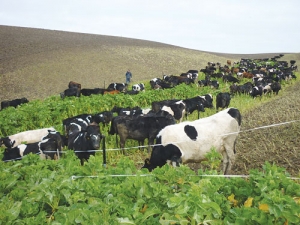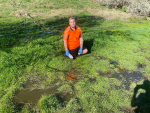Recent results from AgResearch trials in South Otago as part of the Pastoral 21 project have shown that grazed winter forage crops contribute significantly to the risk of nutrient losses to water.
However, with careful management, sediment and phosphorus losses can be reduced during grazing.
DairyNZ developer Maitland Manning says strategic grazing and careful management of wet areas such as gullies and swales in winter forage crops can reduce losses of sediment and phosphorus (P) to surface runoff by 80-90%.
“Gullies and swales are where overland flow and seepage converge to form small channels of running water, which may then flow to streams and rivers. By minimising stock movements and soil treading damage in these areas, any rainfall and runoff that occurs is more likely to infiltrate the soil, reducing the amount of runoff and loss of sediment and P,” says Maitland.
“Simple changes in grazing management of winter crops can result in huge benefits for farmers as well as the environment.”
Strategic grazing means letting cows graze the drier parts of the paddock first and the wetter parts last. This usually means the cows start at the top of the catchment and graze their way downhill towards the gully or swale. The uneaten crop acts as a buffer to minimise the runoff risk.
“If it needs to be grazed at all, the break nearest the gully or swale should be grazed at a time when the soil moisture content is not too high.
“Back fencing as much as possible will minimise soil pugging and compaction damage, and will also help to reduce volumes of surface runoff,” says Maitland.
Southland farmer Geoff Baldwin says he has noticed an improvement in sediment runoff since he has made changes to the way he winters his stock on swedes and kale at his Riverton property.
“Wintering can be a mission here with wet soil, so anything we can do to mitigate sediment losses is beneficial,” says Baldwin.
“We have identified and fenced off swales and we leave a 3-4m boundary along the fenceline which is kept in grass and not ploughed. Sediment is washed into the swales and settles in the grass, so sediment from the crop is reduced. We always graze the crop in front of the cows so the swale is the last place the cows get to,” says Baldwin.
Tips to reduce run-off
- Work out a grazing strategy before putting up fences. Think about stock water sources, i.e. do you need portable troughs?
- Use a winter crop calculator to work out feed requirements to achieve BCS targets at calving.
- Ensure cows begin grazing the least risky parts of the paddock first to minimise the period of runoff risk. This usually means that cows should enter at the top of the paddock and graze their way downhill.
- On-off graze any crop left in the gully or swale at a time when soil moisture content is not too high.
- Fence gullies or swales to provide as much of a buffer zone as possible.
- These initiatives can help farmers to manage soils, animals and forage crops during the challenging winter season so that they can optimise their businesses and reduce their environmental footprint.

















